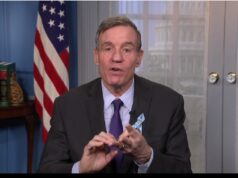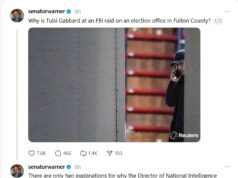From Sen. Mark Warner’s office:
Va. & Md. SENATORS INTRODUCE NEW LEGISLATION REFORMING WMATA SAFETY & RENEWING FEDERAL FUNDING COMMITMENT TO METRO
~ Metro Safety, Accountability and Investment Act of 2019 also protects security of Metro system by prohibiting purchase of Chinese rail cars ~
WASHINGTON – Today, U.S. Sens. Mark R. Warner and Tim Kaine (both D-VA) and U.S. Sens. Ben Cardin and Chris Van Hollen (both D-MD) introduced new legislation to renew the federal funding commitment to Metro, provide critical safety reforms, and strengthen oversight of the Washington Metropolitan Area Transit Authority (WMATA).
Recognizing that the Metro system is integral to the functioning of the federal government, for the last decade Congress has allocated $150 million annually to Metro for capital expenses, with Virginia, Maryland and the District of Columbia each providing $50 million in matching funds. However, the funding – a critical part of Metro’s budget – will expire this year unless Congress acts to renew it. The Metro Safety, Accountability and Investment Act of 2019 will provide additional federal funding for Metro while also enacting key reforms to ensure that the safety and reliability of the Metro system continues to improve.
“The federal government runs on Metro. Thousands of federal workers, contractors, and military service members take Metro every day. This is an investment in the long-term safety and reliability of the Metro system,” said Sen. Warner, a member of the Committee on Banking, Housing and Urban Affairs, which has oversight over our nation’s urban transit systems. “But recent safety problems have illustrated that Metro still has work to do, which is why this money comes with some strings attached to ensure robust oversight, accountability, and meaningful safety reforms at WMATA.”
“Maintaining a safe and reliable public transit system for the seat of the federal government is a clear national priority. We recognized 10 years ago – as we do now – that providing dedicated funding for WMATA will help keep Metro on track,” said Sen. Cardin, ranking member of the Senate Environment and Public Works Transportation and Infrastructure Subcommittee. “Maryland and Virginia’s Senate delegations wholeheartedly agree on the need for critical safety reforms and strengthened oversight to ensure that WMATA becomes as safe and efficient as possible.”
“This bill provides critical funding to reduce WMATA’s backlog of work, along with strict measures to ensure riders are safe on Metro. Following the death of a Virginian on Metrorail in 2015, we made it clear that major changes were needed. Since then, we passed a tough new federal safety oversight body through Congress, encouraged business and labor to work toward mutual goals, and worked with experts to provide WMATA with a roadmap for reform. But this work will only succeed if WMATA has the resources to do the turnaround job right. With this bill, we ensure that the federal government contributes its share, while also making clear that with new money comes new requirements for safety and accountability. Metro’s challenges won’t be solved overnight, but this bill will go a long way toward unlocking progress to rebuild trust with riders,” said Sen. Kaine.
“Maryland commuters and our federal workforce rely on the Metro day in and day out. This legislation reauthorizes the Federal investment in WMATA and provides much-needed funds to modernize our system. In addition to increased funding, this bill includes crucial safety improvements and oversight reforms,” said Sen. Van Hollen, a member of the Committee on Banking, Housing and Urban Affairs. “I’m proud to join my colleagues in introducing this measure as we work to ensure safe and dependable transportation throughout the region.”
The Metro Safety, Accountability and Investment Act of 2019 will renew the federal funding commitment for WMATA capital investments by reauthorizing the funding levels from the Passenger Rail Investment and Improvement Act of 2008 for an additional ten years, at an annual level of $150 million, matched by funding from Virginia, Maryland and the District of Columbia.
In addition, in exchange for key safety, oversight, and governance reforms at WMATA, the new legislation will include an additional $50 million per year in federal funding that is not subject to local match, bringing the annual federal commitment to Metro to $200 million. In order to access the additional $50 million, WMATA will be required to: grant additional powers to Metro’s Inspector General; establish task forces on track safety and bus safety; implement policy and procedures for a new capital planning process; improve the transit asset management planning process; reinforce restrictions on the activities of alternate WMATA Board members to provide more effective Board management and oversight; and prioritize the implementation of new cyber security protections and the integration of wireless services and emergency communications networks.
The bill also prohibits WMATA from using federal funds on a contract for rolling stock from any country that meets certain criteria related to illegal subsidies for state-owned enterprises. Sens. Warner, Kaine, Cardin and Van Hollen raised concerns earlier this year regarding the possibility that Metro may award a contract to build its newest 8000-series rail cars to a Chinese manufacturing company.
“The Federal City Council applauds Sens. Warner, Cardin, Kaine, and Van Hollen for their continued commitment to WMATA and to ensuring that critically needed federal funding for the system is reauthorized this year. This funding, along with the new dedicated funding that was committed by the District of Columbia, Maryland, and Virginia in 2018 is critically needed to ensure a safe, reliable, and sustainable future for Metro,” said Tony Williams, former Mayor of the District of Columbia, current CEO and Executive Director of the Federal City Council and founding member of the MetroNow Coalition. “However, it has been the longstanding position of the Federal City Council and the MetroNow coalition that in addition to funding, Metro is also in need of a better framework to guide decision-making and increase accountability at WMATA—a critical part of the solution that has been missing, until now. With comprehensive enhancements to WMATA’s Office of the Inspector General and capital planning requirements, this legislation will help to safeguard the investment being made in this vital piece of our region’s transportation infrastructure and will inspire confidence in Metro going forward.”
“Metro is critical to those who live and work here and, equally important, it benefits those who travel here to do business, interact with the federal government, and enjoy all our region has to offer,” said Jack McDougle, President & CEO of the Greater Washington Board of Trade and founding member of the MetroNow Coalition. “Every day, we welcome visitors from around the country and the world, requiring us to maintain the safest, most reliable and world-class transit system possible. That’s why we and our partners in the MetroNow coalition urge Congress to pass this legislation.”
“The Amalgamated Transit Union (ATU) fully supports the Metro Safety, Accountability and Investment Act of 2019, renewing the federal commitment for WMATA capital investments. This is long overdue and critical, as the agency’s infrastructure, which dates back to the 1970s, has been crumbling. Riders have paid the price, as service sputtered and fares skyrocketed. Workers have been unfairly blamed for service issues when the real issue has been the generations of state and local lawmakers that until recently have financially starved the system of a critical dedicated revenue source,” said ATU International President John A. Costa. “Tragically, there have been several deadly accidents that have taken the lives of passengers as well as workers. There is no safety culture at WMATA. We thank Senators Warner, Cardin, Kaine and Van Hollen for including in the bill the ATU’s proposed labor-management safety task forces – bus and rail – to develop best principles and practices through collaboration so that we can prevent future tragedies. We are also grateful that these task forces have appropriately been named after ATU members who were killed on the job – Jeanice McMillan, the operator who was killed along with 8 passengers in the 2009 Red Line train crash at Fort Totten and was called a hero by WMATA for saving countless lives, and Keith Dodson, who was struck and killed by a tractor trailer when he exited the bus he was driving after it became disabled along southbound I-395 in Arlington County in 2007.”
More information about this bill is available here. For the full bill text, click here.



![[UPDATED 1/29/26] Audio: Sen. Tim Kaine Talks to Blue Virginia About His “Five-Point Plan” to Fight Trump’s Orban-Like Assault on US Democracy; Civil Disobedience a la MLK Jr.; Trump’s Bogus “Energy Emergency”; the Crucial Importance of the 2025 VA Elections; etc.](https://bluevirginia.us/wp-content/uploads/2025/02/kaineinterview2-238x178.jpg)







